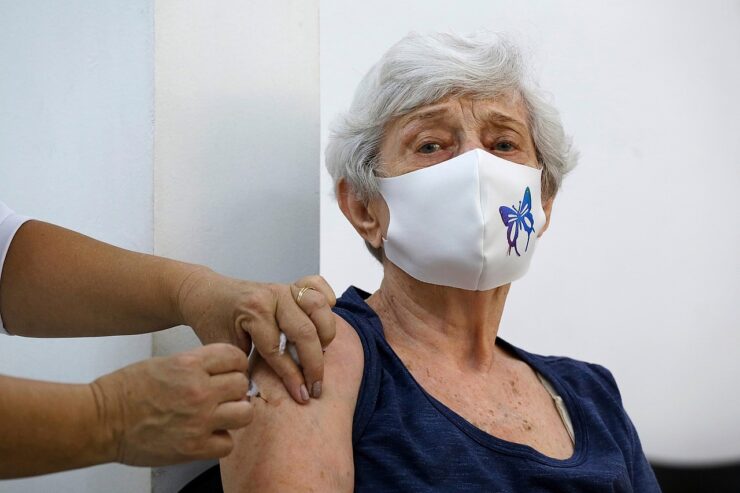As we seek healthy longevity, life course immunisation offers incredible value for our ageing populations, health systems, workforces, and economies overall. But with greater awareness, stronger implementation, and new innovations, we will achieve far more with these health wonders, emphasizes Michael Hodin.
The tremendous success of childhood immunisation campaigns across the 20thcentury is one of the greatest triumphs of public health. Along with advances in sanitation and antibiotics, childhood immunisation has resulted in the miracle of modern longevity: the once extravagant prospect of growing old has become the norm. Now, in our 21st century, isn’t it our great challenge to build on this achievement by realising a healthy longevity? If the world has come to think of immunisation as a rite of passage that begins and ends in childhood, our era’s healthy longevity will, in no small part, turn on immunisation becoming a life course process, including adult vaccination.
The Covid-19 pandemic has drastically impacted global health and has highlighted the threat infectious diseases can pose. Chief among the many lessons from Covid should be the incredible value of vaccination for all ages, and particularly in adulthood – yes, to individuals and the healthcare system, but also to the families, employers, and communities that depend on them.
Thankfully, today, we have a growing number of incredibly safe and effective vaccines, but our public health systems and our understanding have not kept pace with the science. As a result, very few of us know why adult immunisation is critical, what vaccines are available for us at different ages and stages, or even how or where to get them. Nor are our healthcare systems set up to ensure access to this profoundly valuable prevention tool. As a result, vaccine uptake lags far behind, making them one of our best-kept secrets for healthy ageing, more resilient and sustainable health systems, and socioeconomic growth.
As the number of older adults worldwide grows ever larger, the need to prevent disease becomes even more critical. Now in the third year of the Decade of Healthy Ageing, it is clear that life course immunisation can be integrated as a central tool for all of the WHO core areas – Combatting Ageism, Integrated Care, Age Friendly Communities, and Long-Term Care Reform. And, we now have New research shows gaps in policiessupporting widespread adult immunisation.
In honour of the WHO’s World Immunization Week, adult vaccines should be top of mind for all stakeholders to help achieve what the WHO calls “The Big Catch-Up.” Vaccines for adults are increasingly able to prevent diseases that might otherwise have led to a lengthy and costly health crisis, including against various cancers, shingles, devastating respiratory viruses like pneumococcal disease, RSV, and even serious cardiovascular disease, which we now know is frighteningly linked to the flu.
For World Immunization Week, and linked to a major OECD project on the Future of Work, consider vital benefits of adult vaccination:
- Employee Health and Well-being: One lesson from Covid-19 is the powerful expectation employees have for their employers to play a role in public health, including adult immunisation. Productivity, recruitment, retention, and treasured support for healthy ageing are all in scope for employer value to their employees. As companies target recruiting and retaining older adults, employers have interests in them staying healthy.
- Protecting Caregivers: Vaccines keep both adult caregivers and those they care for healthy and active. In research from Harvard Business School, 73% of all U.S. employees are also caregivers, and most employers under-recognise this burden and its impact on their business. AARP research found that 70% of caregivers had to cut back on work in some way due to caregiving responsibilities. Vaccines specifically designed for older adults – such as those for shingles, pneumococcal disease, RSV, Flu – keep grandparents healthy. With a growing number of grandparents across the OECD providing vital childcare so their adult children can work, keeping these grandparents healthy benefits everyone across communities. Because of caregiving’s outsized burden on female employees, adult vaccination can also contribute to greater gender equality in the workplace.
- Innovation and Health System Resilience: The population is ageing across all societies as they modernise, with the majority of the one billion of us on the planet over 60 living in OECD countries. To keep pace, health systems must shift from the acute care, hospital-based, 20th-century model to a predict-and-prevent strategy that relies increasingly on health tech. Life course immunisation will play a profoundly important role in this resilient, sustainable 21st-century health system. From reducing the burden of non-communicable disease to lessening the spread of AMR, immunization across the life-course is a highly efficient and cost-effective public health tool, playing a profoundly important role in the development of resilient and sustainable 21st century health systems. The Return on Investment Ratio is clear – for every USD$1 governments spend on vaccines, their health systems are calculated to save USD$44. And yet, OECD economies spend less than 10% of their prevention budgets on immunisation. Increased investment in immunisation programmes will produce cost savings enabling health systems resilience and sustainability.
As we seek healthy longevity, life course immunisation offfers incredible value for our ageing populations, health systems, workforces, and economies overall. But with greater awareness, stronger implementation, and new innovations, we will achieve far more with these health wonders.
Source: OECD Forum
 Global Coalition On
Global Coalition On 